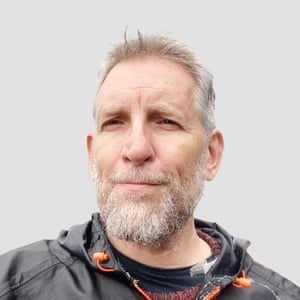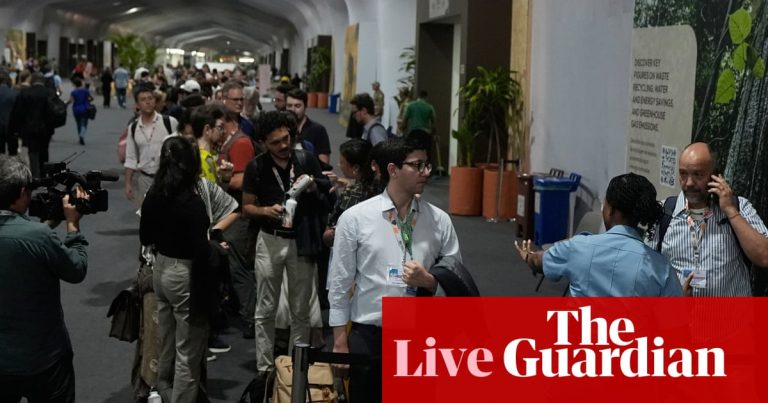Key events
Please turn on JavaScript to use this feature
Reaction to the draft deal keeps coming in. Professor Michael Jacobs of the think tank ODI Global and the University of Sheffield said:
The implacable opposition of Saudi Arabia, the United Arab Emirates, Russia and India to any language here on transitioning away from fossil fuels – the long-term goal agreed by all countries, including them, at the COP two years ago – reveals an increasingly bitter conflict at the heart of global climate politics. It is between those who accept the scientific fact that to deal with climate change the world must wean itself off fossil fuels over the coming decades; and those who are actively resisting this in pursuit of their short term energy interests.
The United States was not present here. But it is inconceivable that the COP was not discussed in Donald Trump’s remarkably friendly meeting in the White House with Saudi Arabian leader Mohammed bin Salman this week – or that it was not a part of Trump’s reversion to the Russian side in the Ukraine war, also this week. I think today we have witnessed what the three countries have agreed.
Geopolitically, this is the creation of a new Axis of Obstruction – actively promoting fossil fuels and opposed to climate action.
Share
Damian Carrington
My colleague Damian Carrington has gone through the mutirão decision text. These are his reflections.
The final version of the key Cop30 text is out – the Brazilian presidency will hope it has got all 194 countries on board and can be passed in the closing plenary. Countries can object to items they don’t like in plenary but that would be a nuclear option at this point.
Here’s two key parts that have changed from the text issued early yesterday, which was heavily criticised by the EU, Latin nations and others pushing for strong climate action.
There is no mention of fossil fuels – the root cause of the climate crisis – due to fierce opposition from petrostates including Saudi Arabia and allies. But there is a new, if coded, reference to the agreement sealed at Cop28 in Dubai in 2023 to transition away from fossil fuels, which was part of a package called the UAE consensus.
The added text says countries should implement their climate plans “taking into account the decisions … such as the United Arab Emirates Consensus”. This might not seem like much of a win, but in the jargon-heavy world of UN climate texts, it counts. The new text also sets up a high-level meeting on the issue for 2026, which is important for continuing progress.
The second key issue is adaptation finance – that is funding to protect people from the impacts of extreme weather and other climate-fuelled impacts – and vital for vulnerable countries. Here, just two words appear to have been added: “at least”.
The new text reads: Cop30 “calls for efforts to at least triple adaptation finance by 2035”. That’s a small improvement but there’s a catch. The date of delivery has been pushed back by five years. The text also makes clear that the adaptation finance is part of the $300bn a year that was agreed last year at Cop29, to be provided from developed to developing countries. Many of the latter wanted it to be additional.
We will see when the plenary starts how countries react, but I can imagine poorer nations, who have done little to cause the climate crisis, being very angry about this.
As one developing country negotiator told the Guardian: “For my people, adaptation is not just a word that is bandied around at a Cop. It means survival. It means the difference between putting food on the table and lining up for humanitarian relief. It means whether crops fail or not. It means whether livestock live or die for lack of water.”
Share
Updated at 16.25 CET

Damien Gayle
Global North countries have been accused of using their apparently cast-iron commitment to a roadmap to phase out fossil fuels as a bargaining chip to dodge their responsibilities to provide climate finance.
There was some surprise among Cop30 attendees on Saturday that a final text appeared without reference to the phase-out plan, after dozens of countries said they would walk out if it was not included. The European commissioner for climate, Wopke Hoekstra, even went so far as to say that the deal on offer was so inadequate that countries may leave with no agreement.
But when the final mutirão cover texts dropped on Saturday morning without any mention of the roadmap – or even of fossil fuels – some civil society campaigners said they suspected its jettisoning was in exchange for watering down commitments on adaptation finance, which had been a key demand of developing countries.
Filipino climate activist Lidy Nacpil, said the final offer on adaptation finance was well below what had been asked for. She said: “We’re not happy about the adaptation finance bit, although we recognise that the Brazilian presidency worked hard to keep it in, because this is the main major real issue, apparently, of the EU. So all the circus about the roadmap was leveraging the watered down sections of the text they don’t want.”
Nacpil said that approach – choosing a single issue to make take a hard position on in the negotiations – had been used by global north countries at previous Cops. She went on: “Because if you if you look at the actual conduct of these governments, if they were really serious about the road map, they would have put it in their NDCs, they would have set an example. And they haven’t. Right?
“If they’re really serious about phasing out, why has Europe been pushing for the expansion of gas, in light of the the invasion of Ukraine and its impact on energy prices? Surely they have turned to other sources like renewable energy?
“It’s much easier to have this simplified although very deceptive narrative that, oh, we’re for ambition and it’s the other side that doesn’t want ambition.”
Share
Our friends at Carbon Brief have published a snap analysis of the new mutirão decision text.
“Calls for” tripling of adaptation finance by 2035, 5 years later than an early draft.
No explicit reference to fossil fuels or a roadmap away from their use.
“Calls on” parties to pursue “full implementation of NDCs while striving to do better”
“Reiterates resolve” to pursue efforts to 1.5C and to minimise overshoot
“Emphasises” importance of halting and reversing deforestation by 2030
Ministerial roundtable on $300bn climate finance goal
Carbon Brief also said the presidency was likely to announce a Brazilian-led initiative to transition away from fossil fuels at the end of the Cop.
Share

Damian Carrington
The deal at Cop30 due to be confirmed shortly is “meaningful progress”, according to Jennifer Morgan, a Cop veteran and former special envoy and state secretary for climate change for Germany. It helps accelerate the phase out of fossil fuels, despite a plan for a roadmap to transition from fossil fuels being blocked from the final summit text.
“While far from what’s needed, the outcome in Belém is meaningful progress,” she said. “The Paris Agreement is working. The transition away from fossil fuels agreed (at Cop28 in 2023) in Dubai is accelerating, and despite the efforts of major oil producing states to slow down the green transition, multilateralism continues to support the interests of the whole world in tackling the climate crisis.”
The Guardian understands the Cop28 agreement to transition away from fossil fuels will be referenced in the text under the overall package it was contained in, the UAE consensus. A roadmap to transition from fossil fuels is expected to be announced, outside the formal UN process but backed by the Brazilian Cop30 presidency and working with the Colombian-led group of nations committed to a road map.
“I think creating a roadmap together gives us a chance that the less developed countries would actually have a more just chance at this transition” Morgan said. “If it’s just ad hoc, every country for itself, fighting to produce the last drop of oil, the big guys now are going to win.”
Share
The key mutirão decision text has been published. Our reporters are working through it and will bring you the highlights when we have them.
Share

Jonathan Watts
In the corridors on the way to the closing plenary, Ana Toni, the executive director of Cop30, expressed disappointment about the absence of a roadmap for a transition away from fossil fuels in the final text.
“It is frustrating in the sense that this is something that is necessary to deal with the climate crisis,” she said. “There wasn’t a consensus about this,“ she said. “But with Brazil holding the presidency of COP, we can do things. We will do things… There will be a year of the Brazilian presidency.”
On the subject of financing for adaptation – a key Brazilian goal from this conference – she declared victory.
“It’s a vital topic for small island nations, for the most vulnerable countries in Africa, in Latin America. And we really wanted adaptation to be included. For the result we expect to come out, we are very happy.”
On the topic of deforestation – a key issue, given this is the first Cop to take place in the Amazon rainforest – Toni said Brazil hoped there to see progress in the final text.
“Let’s take a look. We helped to propose (this topic). There will certainly be movement in this area… So we hope that has been included. And if there isn’t, the presidency of the Cop is totally compromised,” she said.
Share
Updated at 15.31 CET
We have some texts, but we do not have the big one yet (the global mutirão decision).
So far, we have the final versions on the mitigation work programme, the global stocktake, gender, loss and damage, and the global environment facility.
We will bring you more when we have it.
Share

Damien Gayle
Civil society campaigners from the developing world have accused the rich countries of spreading “duplicitous narratives” over their role in the Cop30 climate talks over the past fortnight.
As the talks in Belém, Brazil, passed the deadline for their resolution on Friday, European countries indicated they would walk away from any deal that did not include a commitment for “roadmap” to phase out fossil fuels.
Sources blamed members of a group known as the “like-minded developing countries”, a loose grouping which includes Saudi Arabia, Egypt, Iran and Bolivia for rejecting the wording.
But civil society groups, who are permitted to observe negotiations where the media are not, said the global north had refused the finance to make such a transition plausible.
“We want this to be a Cop of truth, as the Cop presidency has said it should be,” said Lidy Nacpil, the Filipino social justice activist who is coordinator of the Asian Peoples’ Movement on Debt and Development, late on Friday.
“And the narrative that is the developing countries that are not ambitious is not the truth. It is part of many duplicitous narratives that are coming out of this Cop and have come out of previous Cops.”
Speaking at an impromptu press conference in the halls of the conference centre where the summit had gone into extra time, Nacpil said: “We are the first people who have the greatest at stake, for a rapid, equitable, and just transition out of fossil fuels.
“But we cannot accept this circus over a roadmap that is offering us nothing. We cannot accept that this roadmap is now being held as an instrument to hold hostage all the other demands that we have that are equally urgent. So we reject a roadmap that has nothing in it, no climate finance, no clear commitment to a just transition, in fact, blocking it at every step.”
Tasneem Essop, of Climate Action Network International, said the EU, the UK and other rich countries had blocked progress on every single issue the developing world had asked for.
She said: “They blocked everything that the Global South needs from this Cop. And yet here we are with the EU claiming to be champions at this moment of the Cop, going out to the media declaring that they will walk out if they don’t get a road map on fossil fuels. There’s no substance to that road map.”
Share
Updated at 15.22 CET
Even though we do not yet have a final agreement in Brazil, some have already seen enough. Writing in the Conversation this morning, Earth system scientists James Dyke and Johan Rockström say that the prospect of limiting global heating to 1.5C is over. They say that it could be brought back below that level in time, however.
This is an extract of what they have written.
The world lost the climate gamble. Now it faces a dangerous new reality
Ten years ago the world’s leaders placed a historic bet. The 2015 Paris agreement aimed to put humanity on a path to avert dangerous climate change. A decade on, with the latest climate conference ending in Belém, Brazil, without decisive action, we can definitively say humanity has lost this bet.
Warming is going to exceed 1.5°C. We are heading into “overshoot” within the next few years. The world is going to become more turbulent and more dangerous. So, what comes after failure?
Our attempt to answer that question gathered the Earth League – an international network of scientists we work with – for a meeting in Hamburg earlier this year. After months of intensive deliberation, its findings were published this week, with the conclusion that humanity is “living beyond limits”.
Exceed 1.5°C and not only do extreme climate events, like droughts, floods, fires and heatwaves grow in number and severity, impacting billions of people, we also approach tipping points for large Earth regulating systems like the Amazon rainforest and the Greenland and West Antarctic ice sheets. Tropical coral reef systems, livelihood for over 200 million people, are unlikely to cope with overshoot.
This translates to existential risks for billions of people. Not far in the future, but within the next few years for extreme events, and within decades for tipping points.
Share
We are close to the beginning of the plenary. Our reporters on the ground say that delegates are rushing to the room. If you would like to watch along, the livestream will appear here.
Share
Fossil fuel road map will not be in final agreement – Cop30 president
Cop30 president Andre Correa do Lago has said that a roadmap for phasing out fossil fuels will not be in the final agreement, and Brazil will take charge of the issue separately instead.
Speaking on Instagram around 8:10am local time, do Lago said he was positive that countries would back the agreement and that they had been in the negotiating halls into the early hours. “Countries worked together really well,” he told the camera.
At the end, do Lago says more on adaptation financing has been added to the text, but not language on phasing out fossil fuels, the main driver of global heating. Instead, the Brazilian government will oversee this as its own Cop30 initiative after the summit.
Share
Updated at 14.44 CET
On the ground in Belem, the mood has changed ahead of the final plenary, which will begin in around 40 minutes.
“After a sleepless night in Belém, negotiations have moved in a more positive direction than many feared 12 hours ago. What’s emerging is a compromise that advances 1.5°C action, adaptation, and trade – and includes a provision that may not be called a ‘fossil fuel roadmap,’ but is clearly meant to achieve the same end. Brazil deserves credit for the energy it has invested across this COP cycle but must keep pushing. The next few hours will be pivotal in deciding whether COP30 stumbles or sprints across the finish line,” says Clare Shakya, global managing director of climate with the Nature Conservancy.
In the venue, people are already busy packing up pavilions. As my colleague Damian Carrington snapped this morning, the Saudis are already shutting up shop.
Share

Damian Carrington
The US – by its absence not presence – has had a major impact on what appears likely to be a disappointing deal at the Cop30 climate summit. This is because the US is the only country with the power to influence Saudi Arabia, observers say.
The oil-rich kingdom has a decades-long history of obstructing the climate talks to protect its lucrative industry and has been widely blamed here in Belém for leading efforts to block any mention of fossil fuels. With Donald Trump calling climate change a “con job”, the US did not send a delegation to Cop30 and is withdrawing from the Paris agreement. Saudi Crown Prince Mohammed bin Salman had a friendly meeting with Trump on Tuesday.
“Unfortunately with the departure of the US, we have lost one of the most powerful countries,” said Tom Rivett-Carnac, political strategist to the UN climate chief when the Paris agreement was done.
“In the years when I was involved in Cops, when the US is really behind an agreement and really wants to make it happen, and is prepared to exert its economic authority in bringing, for example, the Saudi Arabians round, then we can really do things,” he told the BBC.
“The trouble I think we are experiencing in Brazil is we don’t have that big push from the US and there is an emboldened attitude among the oil producing countries who feel there won’t be a consequence for them if they delay.”
Sources inside the negotiations have made the same point to the Guardian. The diplomatic might of the US, under presidents backing climate action, has often been a key factor in getting Cop deals over the line.
In October, bullying tactics by the US and a vote called by Saudi Arabia killed a plan to place a small levy on the carbon emissions on shipping.
Share
What happens if too many people leave the summit?
As Cop30 continues to overrun, a growing concern is what happens if delegates start to leave the venue. For all UN meetings, a key percentage of government need to be in the room. If it slips below that figure, the meeting is adjourned and everyone goes home.
The excellent Ed King wrote about this in his Climate Diplomacy Brief this morning:
Quorum is key: as cruise ships leave, many delegates have nowhere to stay tonight and will be heading out. Pacific delegates and many UN staffers are among those impacted. Brazil faces a race against time. Lula faces the prospect of explaining to G20 leaders why a summit he hoped would propel him to election victory in 2026 has ended in abject failure, with little to no support from his Brics allies and Saudi Arabia, which tried to kill efforts to talk cuts on Friday.
Remember, while large countries can have delegations of a few dozen people, many developing countries only send one or two representatives. If you need to fly home from Belem to a Pacific island or central Africa, bookings are hard to move.
At the biodiversity Cop16 in Cali last year, the meeting ended in disarray after too many negotiators were forced to head home. The meeting had to be completed in Rome a few months later. That is a scenario we cannot rule out.
Share
Updated at 13.46 CET
Ahead of the final plenary, I checked in with our environment editor Fiona Harvey in Belem to ask what we might expect in the next couple of hours. The word on the ground is that we should expect a final plenary to begin in the next 90 minutes or so. But in truth, it is unclear.
This is what she told me:
It’s as clear as mud. They have called the plenary for 10am Belem time but we don’t know what is happening to the text or if they will try to gavel something through without that. It could be that there’s a plenary and then it adjourns quite quickly for people to finish the negotiations – or they just try to barrel it all through. We just do not know.
Meanwhile, ministers are arriving at the venue.
Share
Good morning and welcome to our coverage of Cop30 in Belem.
We are at the business end of the climate summit. Today appears to be the day that we will get an agreement in some form, but anything is still possible at this stage. Delegates are tired – ministers will have likely negotiated into the early hours – and return flights are getting closer. We are still waiting for a revised text for governments to debate at a closing plenary, which is set to begin at 10am local time (1pm in London). But as always, timings are flexible.
Cop30 president Andre Correa do Lago has arrived at the venue. He was photographed whispering into his phone a few minutes ago. Countries appear to be still far apart on any agreement to draw up a roadmap to transition away from fossil fuels. Can do Lago and his negotiating team thread the needle?
If you would like to catch up on the state of play, our reporters on the ground have been hard at work summarising proceedings. Here is a summary of the headlines:
The UK energy secretary Ed Miliband said a deal to create a roadmap away from fossil fuels needed to happen “one way or another” – even if it was a voluntary process.
One representative from a country vulnerable to the climate crisis said: “Sometimes it’s like we are arguing with robots.”
Observers claimed the Arab group of nations had warned any mention of phasing out fossil fuels in final negotiations would see the talks collapse.
The architect of the Paris climate deal, Laurence Tubiana, said countries should not fear pursuing a deal on a roadmap.
Turkey and Australia has agreed to the details on hosting next year’s Cop31 summit, that will be held in Turkey. Turkey will take on the Cop31 presidency and an Australian – energy minister Chris Bowen – will be appointed vice-president and “president of negotiations”
Africa governments were still pushing for a tripling of the finance available from rich countries to help the poor world adapt to the impacts of the climate crisis.
AP reported that Juan Carlos Monterrey Gomez, a top negotiator for Panama, had said the decades-long United Nations process risks “becoming a clown show” for the omission of burning of fuels such as oil, gas and coal as causes of global warming from the final text.
Share
Updated at 13.46 CET

